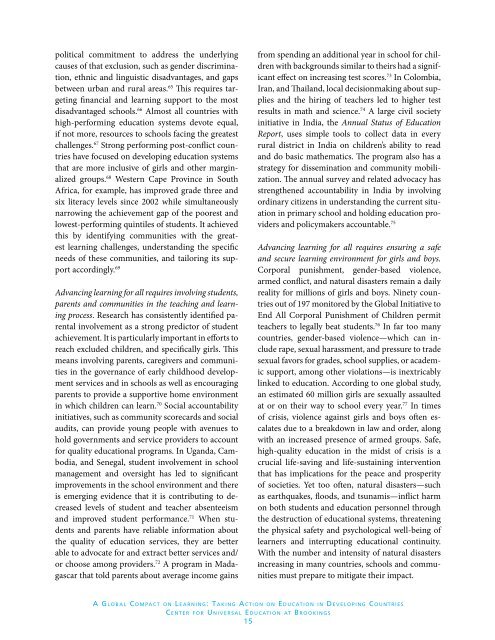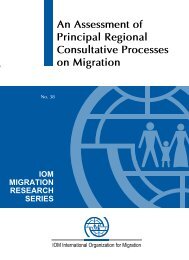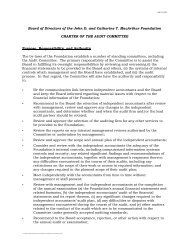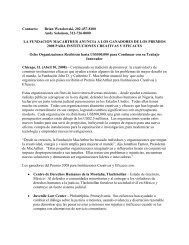A Global Compact on Learning - Brookings Institution
A Global Compact on Learning - Brookings Institution
A Global Compact on Learning - Brookings Institution
Create successful ePaper yourself
Turn your PDF publications into a flip-book with our unique Google optimized e-Paper software.
political commitment to address the underlying<br />
causes of that exclusi<strong>on</strong>, such as gender discriminati<strong>on</strong>,<br />
ethnic and linguistic disadvantages, and gaps<br />
between urban and rural areas. 65 This requires targeting<br />
financial and learning support to the most<br />
disadvantaged schools. 66 Almost all countries with<br />
high-performing educati<strong>on</strong> systems devote equal,<br />
if not more, resources to schools facing the greatest<br />
challenges. 67 Str<strong>on</strong>g performing post-c<strong>on</strong>flict countries<br />
have focused <strong>on</strong> developing educati<strong>on</strong> systems<br />
that are more inclusive of girls and other marginalized<br />
groups. 68 Western Cape Province in South<br />
Africa, for example, has improved grade three and<br />
six literacy levels since 2002 while simultaneously<br />
narrowing the achievement gap of the poorest and<br />
lowest-performing quintiles of students. It achieved<br />
this by identifying communities with the greatest<br />
learning challenges, understanding the specific<br />
needs of these communities, and tailoring its support<br />
accordingly. 69<br />
Advancing learning for all requires involving students,<br />
parents and communities in the teaching and learning<br />
process. Research has c<strong>on</strong>sistently identified parental<br />
involvement as a str<strong>on</strong>g predictor of student<br />
achievement. It is particularly important in efforts to<br />
reach excluded children, and specifically girls. This<br />
means involving parents, caregivers and communities<br />
in the governance of early childhood development<br />
services and in schools as well as encouraging<br />
parents to provide a supportive home envir<strong>on</strong>ment<br />
in which children can learn. 70 Social accountability<br />
initiatives, such as community scorecards and social<br />
audits, can provide young people with avenues to<br />
hold governments and service providers to account<br />
for quality educati<strong>on</strong>al programs. In Uganda, Cambodia,<br />
and Senegal, student involvement in school<br />
management and oversight has led to significant<br />
improvements in the school envir<strong>on</strong>ment and there<br />
is emerging evidence that it is c<strong>on</strong>tributing to decreased<br />
levels of student and teacher absenteeism<br />
and improved student performance. 71 When students<br />
and parents have reliable informati<strong>on</strong> about<br />
the quality of educati<strong>on</strong> services, they are better<br />
able to advocate for and extract better services and/<br />
or choose am<strong>on</strong>g providers. 72 A program in Madagascar<br />
that told parents about average income gains<br />
from spending an additi<strong>on</strong>al year in school for children<br />
with backgrounds similar to theirs had a significant<br />
effect <strong>on</strong> increasing test scores. 73 In Colombia,<br />
Iran, and Thailand, local decisi<strong>on</strong>making about supplies<br />
and the hiring of teachers led to higher test<br />
results in math and science. 74 A large civil society<br />
initiative in India, the Annual Status of Educati<strong>on</strong><br />
Report, uses simple tools to collect data in every<br />
rural district in India <strong>on</strong> children’s ability to read<br />
and do basic mathematics. The program also has a<br />
strategy for disseminati<strong>on</strong> and community mobilizati<strong>on</strong>.<br />
The annual survey and related advocacy has<br />
strengthened accountability in India by involving<br />
ordinary citizens in understanding the current situati<strong>on</strong><br />
in primary school and holding educati<strong>on</strong> providers<br />
and policymakers accountable. 75<br />
Advancing learning for all requires ensuring a safe<br />
and secure learning envir<strong>on</strong>ment for girls and boys.<br />
Corporal punishment, gender-based violence,<br />
armed c<strong>on</strong>flict, and natural disasters remain a daily<br />
reality for milli<strong>on</strong>s of girls and boys. Ninety countries<br />
out of 197 m<strong>on</strong>itored by the <str<strong>on</strong>g>Global</str<strong>on</strong>g> Initiative to<br />
End All Corporal Punishment of Children permit<br />
teachers to legally beat students. 76 In far too many<br />
countries, gender-based violence—which can include<br />
rape, sexual harassment, and pressure to trade<br />
sexual favors for grades, school supplies, or academic<br />
support, am<strong>on</strong>g other violati<strong>on</strong>s—is inextricably<br />
linked to educati<strong>on</strong>. According to <strong>on</strong>e global study,<br />
an estimated 60 milli<strong>on</strong> girls are sexually assaulted<br />
at or <strong>on</strong> their way to school every year. 77 In times<br />
of crisis, violence against girls and boys often escalates<br />
due to a breakdown in law and order, al<strong>on</strong>g<br />
with an increased presence of armed groups. Safe,<br />
high-quality educati<strong>on</strong> in the midst of crisis is a<br />
crucial life-saving and life-sustaining interventi<strong>on</strong><br />
that has implicati<strong>on</strong>s for the peace and prosperity<br />
of societies. Yet too often, natural disasters—such<br />
as earthquakes, floods, and tsunamis—inflict harm<br />
<strong>on</strong> both students and educati<strong>on</strong> pers<strong>on</strong>nel through<br />
the destructi<strong>on</strong> of educati<strong>on</strong>al systems, threatening<br />
the physical safety and psychological well-being of<br />
learners and interrupting educati<strong>on</strong>al c<strong>on</strong>tinuity.<br />
With the number and intensity of natural disasters<br />
increasing in many countries, schools and communities<br />
must prepare to mitigate their impact.<br />
A <str<strong>on</strong>g>Global</str<strong>on</strong>g> Compa c t <strong>on</strong> <strong>Learning</strong>: Taking Acti<strong>on</strong> <strong>on</strong> Educat i o n in Developing Countries<br />
C e n t e r for Universal Educat i o n at <strong>Brookings</strong><br />
15






